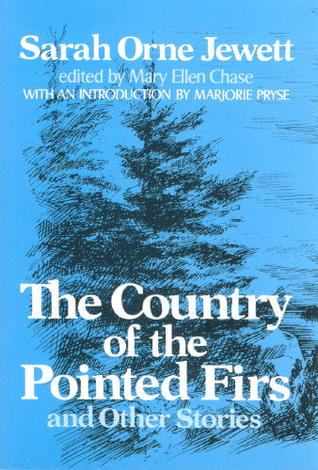Review: ‘Country of the Pointed Firs’ by Sarah Orne Jewett
 Back in January I wrote a bit about Sarah Orne Jewett, author of The Country of the Pointed Firs. She was such an interesting woman that I almost feel a bit guilty for not liking this book more than I did; Jewett’s critics complained that her stories lacked plot, something of which she herself was well aware, and (while I don’t think that this is always a bad thing in a book) in this case it didn’t agree with me.
Back in January I wrote a bit about Sarah Orne Jewett, author of The Country of the Pointed Firs. She was such an interesting woman that I almost feel a bit guilty for not liking this book more than I did; Jewett’s critics complained that her stories lacked plot, something of which she herself was well aware, and (while I don’t think that this is always a bad thing in a book) in this case it didn’t agree with me.
From reading the description and from the way that the book opens, I had expected The Country of the Pointed Firs to be a sort of American Cranford. Consequently, I was expecting to love it as much as I did Elizabeth Gaskell’s lovely novella when I read it last year. To say that I did not is a bit of an understatement: I didn’t dislike the book, I just thought it was ok. That’s not to say that I thought The Country of the Pointed Firs was a bad book, but it was one that didn’t work for me. It’s perhaps unfair of me to judge a book based on the merits of another, but the set up is so similar that I can’t help it. In both books the narrator returns to a small, unremarkable town that holds a place in her heart, and then proceeds to introduce the reader to the town’s residents and all the quirks that come with small town life. However, there the similarities end.
Although the concept is a lot like that of Cranford, the execution and the mood of the book are very different. Cranford chronicles the little, but all important, incidents in the lives of the women who live there, whereas The Country of the Pointed Firs is more of a series of character studies: Jewett introduces the reader to characters and more often than not just lets them sit there. Sometimes there will be an anecdote, occasionally there may be tea, but by and large nothing happens. This is not in the way that nothing happens in Cranford, where the little, everyday things are made to seem important to the reader because they are important to the characters, infused with Elizabeth Gaskell’s warmth and humour, but in a way that emphasises the slow and sedate pace of life and the reserved nature of its people. Whereas Cranford had a real feel of community to it, The Country of the Pointed Firs portrayed a life that was typified by, if not loneliness, then at least isolation, broken by occasional moments of contact with others. Most of the characters are widows, widowers, or people who simply never married. Some of them were intriguing (I particularly liked Mrs Todd and the widowed fisherman who sits alone in his cottage knitting) but I find myself failing to remember many of them.
The book starts out so promisingly:
When one really knows a village like this and its surroundings, it is like becoming acquainted with a single person. The process of falling in love at first sight is as final as it is swift in such a case, but the growth of true friendship may be a lifelong affair.
After a first brief visit made two or three summers before in the course of a yachting cruise, a lover of Dunnet Landing returned to find the unchanged shores of the pointed firs, the same quaintness of the village with its elaborate conventionalities; all that mixture of remoteness, and childish certainty of being the centre of civilization of which her affectionate dreams had told.
I expected to be made to feel all these things as the narrator discovered them anew, but I didn’t. Ultimately, how much any reader enjoys this book will boil down to how much they like the characters in it, because Jewett gives you nothing else to go on. As for me, I found the book interesting as a reading experience (particularly given my woeful lack of experience of American fiction), but one that was interesting in an intellectual rather than emotional way. I found myself unmoved.
If anyone would like my copy of this book, please leave me a message in the comments. It came from BookMooch, so it’s a bit battered and has occasional marginal notes, but I’d like to see it go to a good home as it’s not one I’m likely to read again.
The Country of the Pointed Firs and Other Stories by Sarah Orne Jewett. Published by Norton, 1981, pp. 296. Originally published in 1896.